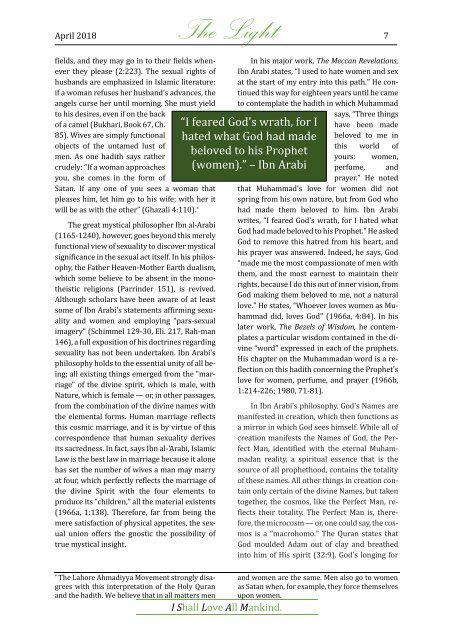The Light April 2018 04
English organ of the Lahore Ahmadiyya Movement. Presenting the Islam taught by the Holy Prophet Muhammad (s) - liberal, inclusive, tolerant, peaceful and rational.
English organ of the Lahore Ahmadiyya Movement. Presenting the Islam taught by the Holy Prophet Muhammad (s) - liberal, inclusive, tolerant, peaceful and rational.
You also want an ePaper? Increase the reach of your titles
YUMPU automatically turns print PDFs into web optimized ePapers that Google loves.
<strong>April</strong> <strong>2018</strong> <strong>The</strong><br />
<strong>Light</strong> 7<br />
fields, and they may go in to their fields whenever<br />
they please (2:223). <strong>The</strong> sexual rights of<br />
husbands are emphasized in Islamic literature:<br />
if a woman refuses her husband's advances, the<br />
angels curse her until morning. She must yield<br />
to his desires, even if on the back<br />
of a camel (Bukhari, Book 67, Ch.<br />
85). Wives are simply functional<br />
objects of the untamed lust of<br />
men. As one hadith says rather<br />
crudely: “If a woman approaches<br />
you, she comes in the form of<br />
Satan. If any one of you sees a woman that<br />
pleases him, let him go to his wife; with her it<br />
will be as with the other” (Ghazali 4:110). *<br />
<strong>The</strong> great mystical philosopher Ibn al-Arabi<br />
(1165-1240), however, goes beyond this merely<br />
functional view of sexuality to discover mystical<br />
significance in the sexual act itself. In his philosophy,<br />
the Father Heaven-Mother Earth dualism,<br />
which some believe to be absent in the monotheistic<br />
religions (Parrinder 151), is revived.<br />
Although scholars have been aware of at least<br />
some of Ibn Arabi's statements affirming sexuality<br />
and women and employing “pars-sexual<br />
imagery” (Schimmel 129-30, Eli. 217, Rah-man<br />
146), a full exposition of his doctrines regarding<br />
sexuality has not been undertaken. Ibn Arabi's<br />
philosophy holds to the essential unity of all being;<br />
all existing things emerged from the "marriage"<br />
of the divine spirit, which is male, with<br />
Nature, which is female — or, in other passages,<br />
from the combination of the divine names with<br />
the elemental forms. Human marriage reflects<br />
this cosmic marriage, and it is by virtue of this<br />
correspondence that human sexuality derives<br />
its sacredness. In fact, says Ibn al-'Arabi, Islamic<br />
Law is the best law in marriage because it alone<br />
has set the number of wives a man may marry<br />
at four, which perfectly reflects the marriage of<br />
the divine Spirit with the four elements to<br />
produce its “children,” all the material existents<br />
(1966a, 1:138). <strong>The</strong>refore, far from being the<br />
mere satisfaction of physical appetites, the sexual<br />
union offers the gnostic the possibility of<br />
true mystical insight.<br />
* <strong>The</strong> Lahore Ahmadiyya Movement strongly disagrees<br />
with this interpretation of the Holy Quran<br />
and the hadith. We believe that in all matters men<br />
I Shall Love All Mankind.<br />
In his major work, <strong>The</strong> Meccan Revelations,<br />
Ibn Arabi states, “I used to hate women and sex<br />
at the start of my entry into this path.” He continued<br />
this way for eighteen years until he came<br />
to contemplate the hadith in which Muhammad<br />
“I feared God's wrath, for I<br />
hated what God had made<br />
beloved to his Prophet<br />
(women).” – Ibn Arabi<br />
says, “Three things<br />
have been made<br />
beloved to me in<br />
this world of<br />
yours: women,<br />
perfume, and<br />
prayer.” He noted<br />
that Muhammad's love for women did not<br />
spring from his own nature, but from God who<br />
had made them beloved to him. Ibn Arabi<br />
writes, “I feared God's wrath, for I hated what<br />
God had made beloved to his Prophet.” He asked<br />
God to remove this hatred from his heart, and<br />
his prayer was answered. Indeed, he says, God<br />
“made me the most compassionate of men with<br />
them, and the most earnest to maintain their<br />
rights, because I do this out of inner vision, from<br />
God making them beloved to me, not a natural<br />
love.” He states, “Whoever loves women as Muhammad<br />
did, loves God” (1966a, 4:84). In his<br />
later work, <strong>The</strong> Bezels of Wisdom, he contemplates<br />
a particular wisdom contained in the divine<br />
“word” expressed in each of the prophets.<br />
His chapter on the Muhammadan word is a reflection<br />
on this hadith concerning the Prophet's<br />
love for women, perfume, and prayer (1966b,<br />
1:214-226; 1980, 71-81).<br />
In Ibn Arabi’s philosophy, God's Names are<br />
manifested in creation, which then functions as<br />
a mirror in which God sees himself. While all of<br />
creation manifests the Names of God, the Perfect<br />
Man, identified with the eternal Muhammadan<br />
reality, a spiritual essence that is the<br />
source of all prophethood, contains the totality<br />
of these names. All other things in creation contain<br />
only certain of the divine Names, but taken<br />
together, the cosmos, like the Perfect Man, reflects<br />
their totality. <strong>The</strong> Perfect Man is, therefore,<br />
the microcosm — or, one could say, the cosmos<br />
is a “macrohomo.” <strong>The</strong> Quran states that<br />
God moulded Adam out of clay and breathed<br />
into him of His spirit (32:9). God's longing for<br />
and women are the same. Men also go to women<br />
as Satan when, for example, they force themselves<br />
upon women.














